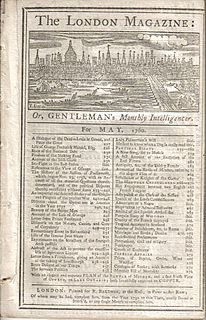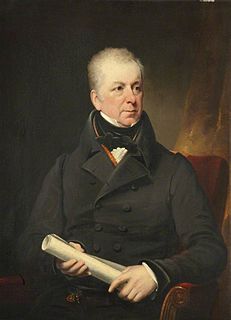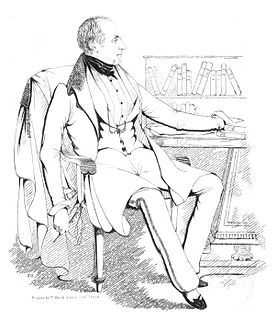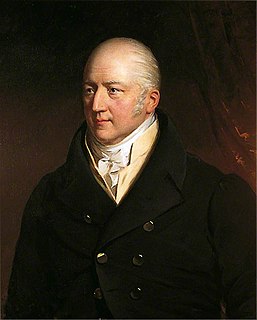Related Research Articles

Captain Frederick Marryat was a Royal Navy officer, a novelist, and an acquaintance of Charles Dickens. He is noted today as an early pioneer of nautical fiction, particularly for his semi-autobiographical novel Mr Midshipman Easy (1836). He is remembered also for his children's novel The Children of the New Forest (1847), and for a widely used system of maritime flag signalling known as Marryat's Code.
This article contains information about the literary events and publications of 1832.

James Hogg was a Scottish poet, novelist and essayist who wrote in both Scots and English. As a young man he worked as a shepherd and farmhand, and was largely self-educated through reading. He was a friend of many of the great writers of his day, including Sir Walter Scott, of whom he later wrote an unauthorised biography. He became widely known as the "Ettrick Shepherd", a nickname under which some of his works were published, and the character name he was given in the widely read series Noctes Ambrosianae, published in Blackwood's Magazine. He is best known today for his novel The Private Memoirs and Confessions of a Justified Sinner. His other works include the long poem The Queen's Wake (1813), his collection of songs Jacobite Relics (1819), and his two novels The Three Perils of Man (1822), and The Three Perils of Woman (1823).

Frederick Chamier was an English novelist, autobiographer and naval captain born in London. He was the author of several nautical novels that remained popular through the 19th century.
Henry Colburn was a British publisher.

The London Magazine is a publication of arts, literature and miscellaneous interests. Its history ranges across nearly three centuries and several reincarnations, publishing writers including William Wordsworth, William S. Burroughs, Winston Churchill and John Keats.

Henry Hetherington was an English printer, bookseller, publisher and newspaper proprietor who campaigned for social justice, a free press, universal suffrage and religious freethought. Together with his close associates, William Lovett, John Cleave and James Watson, he was a leading member of numerous co-operative and radical groups, including the Owenite British Association for the Promotion of Co-operative Knowledge, the National Union of the Working Classes and the London Working Men's Association. As proprietor of The Poor Man's Guardian he played a major role in the "War of the Unstamped" and was imprisoned three times for refusing to pay newspaper stamp duty. He was a leader of the "moral force" wing of the Chartist movement and a supporter of pro-democracy movements in other countries. His name is included on the Reformers' Memorial in Kensal Green Cemetery.

Isaac Gascoyne was a British Army officer and Tory politician. He was born at Barking, London Essex on 21 August 1763, the third son of Bamber Gascoyne (senior) and Mary Green and was educated at Felsted School.
The New Monthly Magazine was a British monthly magazine published from 1814 to 1884. It was founded by Henry Colburn and published by him through to 1845.
Thomas Kibble Hervey was a Scottish-born poet and critic. He rose to be the Editor of the Athenaeum, a leading British literary magazine in the 19th century.

David Lester Richardson was an officer of the East India Company, who throughout his life followed literary pursuits as a poet and periodical writer, and as editor and proprietor of literary journals. A skilled linguist, he was in later life an educator, serving as professor of English at Hindu College, where he inspired the Bengali poet Michael Madhusudan Dutta.
Tait's Edinburgh Magazine was a monthly periodical founded in 1832. It was an important venue for liberal political views, as well as contemporary cultural and literary developments, in early-to-mid-nineteenth century Britain.
Edward Howard was an English novelist and sub-editor of The Metropolitan Magazine. He then worked for New Monthly Magazine. His best known books were Sir Henry Morgan and Rattlin the Reefer.
George Frederick Nott (1767–1841) was an English author and a Church of England clergyman.

Benjamin Harrison (1808–1887) was an Anglican clergyman and ecclesiastical administrator. His father was Benjamin Harrison, Treasurer of Guy's Hospital.
The Cyclopædia of Practical Medicine was a British monthly medical journal, first published in 1832. It was divided into alphabetical articles, and came to four volumes, part-published and then completed by 1835. The volumes were:
- Abd–Ele (1832);
- Eme–Isc (1833);
- Jau–Sma (1834);
- Sof–Yaw (1835).
William Tooke FRS (1777–1863) was an English lawyer, politician, and President of the Society of Arts.

Paul Hardy, was an English illustrator, well known for his regular illustrations in The Strand Magazine and his painting of Canterbury Pilgrims (1903), and his drawings were associated with the serials of the writer Samuel Walkey (1871-1953). Paul was the son of David Hardy, also an artist, as was his grandfather, all from an old Yorkshire family.

Joseph Marryat was an English West India merchant and banker, serving as an MP from 1808 until his death in 1824. He was a slave-owner and a strong opponent of abolitionism.
References
- 1 2 3 "Metropolitan Magazine" (pdf). Gary Simons. March 2014. Retrieved 3 April 2016.
pp. 1–66, "Part A Tables of Contents and Identification of Contributors"
pp. 67–84, "Part B Bibliographies of Contributors"
The magazine was published in "two separately paginated sections". The two-part, 2014 guide by Simons covers only the primary section of the magazine, "Original Papers". - 1 2 3 The Metropolitan Magazine. OCLC 58892017. WorldCat library record. Retrieved 7 January 2019.
- 1 2 Jessica Hinings, "Howard, Edward (bap. 1793, d. 1841)", Oxford Dictionary of National Biography (Oxford, UK: OUP, 2004) Retrieved 3 April 2016, pay-walled.
- ↑ J. K. Laughton, "Marryat, Frederick (1792–1848)", rev. Andrew Lambert, Oxford Dictionary of National Biography (Oxford, UK: OUP, 2004) Retrieved 2 January 2016.
- ↑ Hunter, Adrian 9ed.) (2020), James Hogg: Contributions to English, Irish and American Periodicals, Edinburgh University Press, pp. xxv - xxxii, ISBN 9780748695980
- ↑ John Warrack, "Crouch, Frederick Nicholls (1808–1896)", Oxford Dictionary of National Biography (Oxford, UK: OUP, 2004) Retrieved 3 April 2016.